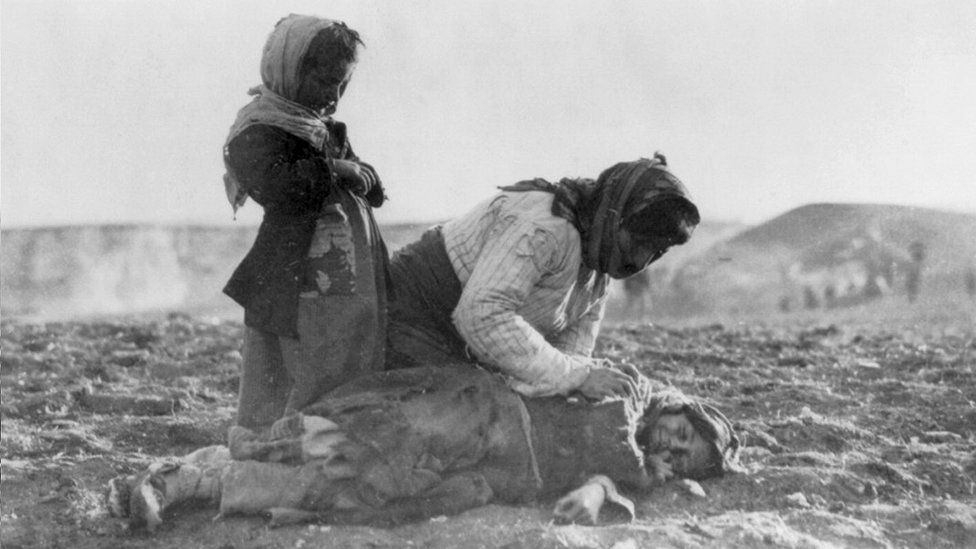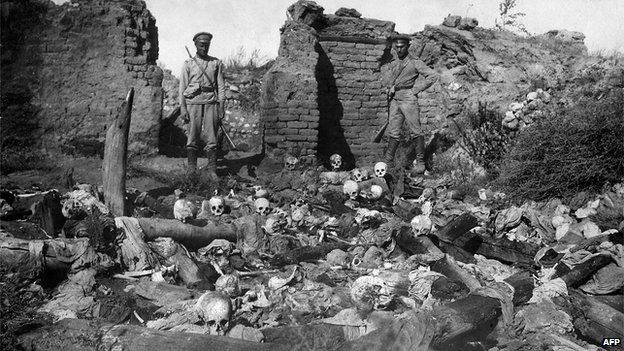What was the Armenian “genocide” and why is it still such a sensitive issue?

image copyrightLibrary of Congress
The mass killing of Armenians by Ottoman Turks during World War One remains a highly sensitive issue.
Turkey has resisted widespread calls for it to recognise the 1915-16 killings as genocide, while historians continue to argue about the events. At the time there were numerous reports of Turkish atrocities committed against the Armenians.
There is general agreement that hundreds of thousands of Armenians died when the Ottoman Turks deported them en masse from eastern Anatolia to the Syrian desert and elsewhere in 1915-16. They were killed or died from starvation or disease.
Foreign witnesses including journalists, missionaries and diplomats reported on the atrocities.
The total number of Armenian dead is disputed. Armenians say 1.5 million died. The Republic of Turkey estimates the total to be 300,000.
According to the International Association of Genocide Scholars (IAGS), the death toll was “more than a million”.
In a 2005 letter to Turkey’s then prime minister, Recep Tayyip Erdogan, the IAGS said: “We want to underscore that it is not just Armenians who are affirming the Armenian Genocide but it is the overwhelming opinion of scholars who study genocide.”
Article Two of the UN Convention on Genocide of December 1948 describes genocide as carrying out acts intended “to destroy, in whole or in part, a national, ethnic, racial or religious group”.
The dispute about whether it was genocide centres on the question of premeditation – the degree to which the killings were orchestrated.
Many historians, governments and the Armenian people believe that they were; but a number of scholars question this.
Raphael Lemkin, the Polish-Jewish lawyer who coined the term “genocide” in 1943, referred to the atrocities against Armenians as well as the Nazi massacres of Jews when describing his investigations.
Turkish officials accept that atrocities were committed but argue that there was no systematic attempt to destroy the Christian Armenian people. Turkey says many Muslim Turks also died in the turmoil of war.
The Young Turks – an officers’ movement that had seized power in 1908 – launched a series of measures against Armenians as the Ottoman Empire was crumbling through military defeats in the war. The Young Turks – calling themselves the Committee of Unity and Progress (CUP) – had entered the war on Germany’s side in 1914.
Turkish propaganda at the time presented the Armenians as saboteurs and a pro-Russian “fifth column”.
Armenians mark the date 24 April 1915 as the start of what they regard as the genocide. That was when the Ottoman government arrested about 250 Armenian intellectuals and community leaders. They were later executed.
Armenians in the Ottoman army were disarmed and killed. Armenian property was confiscated.
Several senior Ottoman officials were put on trial in Turkey in 1919-20 in connection with the atrocities. A local governor, Mehmed Kemal, was found guilty and hanged for the mass killing of Armenians in the central Anatolian district of Yozgat. The Young Turks’ top triumvirate – the “Three Pashas” – had already fled abroad. They were sentenced to death in absentia.
Historians have questioned the judicial procedures at these trials, the quality of the evidence presented and the degree to which the Turkish authorities may have wished to appease the victorious Allies.

image copyrightAFP
The latest world leader to do so was US President Joe Biden on 24 April, the 106th anniversary of the killings.
Argentina, Brazil, Belgium, Canada, France, Germany, Italy, the Netherlands, Portugal, Russia and Uruguay are among the more than 20 other countries which have formally recognised genocide against the Armenians.
In some cases the recognition has come in parliament resolutions, not from governments.
Among the most significant was that of the US Congress in 2019.
US governments had held back for decades, partly because Turkey is the second-biggest military power in Nato and strategically vital for the West.
The US hosts the largest Armenian diaspora after Russia, estimated at more than a million.
The European Parliament and the UN Sub-Commission on Prevention of Discrimination and Protection of Minorities have also recognised the atrocities as genocide.
Turkey reacted angrily after Pope Francis called it “the first genocide of the 20th Century” in the run-up to the centenary commemorations.
Turkey recalled its Vatican ambassador and accused the Pope of having “discriminated about people’s suffering”. The Pope “overlooked atrocities that Turks and Muslims suffered in World War One and only highlighted the Christian suffering, especially that of the Armenian people”, the Turkish foreign ministry said.
France has a large Armenian diaspora and since 2019 it has officially commemorated “the Armenian genocide” on 24 April, including a ceremony at a Paris monument.
The killings are regarded as the seminal event of modern Armenian history, binding the diaspora together. Armenians are one of the world’s most dispersed peoples.
In Turkey, public debate on the issue has been stifled. Article 301 of the penal code, on “insulting Turkishness”, has been used to prosecute prominent writers who highlight the mass killings of Armenians.
Among them were Nobel laureate Orhan Pamuk and Hrant Dink, who was later shot dead in January 2007. A teenage ultra-nationalist, Ogun Samast, was jailed for nearly 23 years in July 2011 for murdering Dink, a Turkish-Armenian who edited a bilingual newspaper. And in March 2021 two Turkish ex-police chiefs were jailed for life over the murder of Dink.
The European Union has said Turkish acceptance of the Armenian genocide is not a condition for Turkey’s entry into the bloc.
Yes – they have no official diplomatic ties. After decades of hostility there was a slight thaw, but since 2009 there has been no real rapprochement.
In 2020 a six-week war over Nagorno-Karabakh aggravated Armenian-Turkish tension.
Turkey backed Azerbaijan over Nagorno-Karabakh, a territory inside Azerbaijan held by ethnic Armenians since a war in the 1990s. Azerbaijan made big territorial gains and pushed Armenian forces out of adjacent areas.
Weeks before the outbreak of fighting in September 2020 Turkey had held large-scale military exercises with Azerbaijan.
Correction July 2008: This article has been amended following a ruling by the BBC Trust.